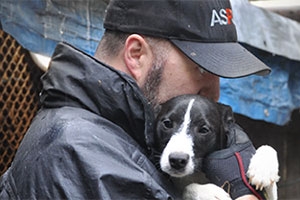
Puppy mill: a commercial dog breeding facility that is operated with the intention of making profits over animal welfare and is often in inhumane conditions regarding the well-being of dogs, also known as a puppy factory.
According to annimalrescuecorps.org, there are an estimated 15,000 puppy mills in the United States. In these mass-production factories, dogs are forced to produce litter after litter of puppies, causing many health issues. Not only do puppy mills supply nearly 100 percent of pet stores, many of these dogs have complications such as diseases, emotional and social issues, as well as deformities and genetic disorders. These puppies live in crowded and unsanitary cages without sufficient veterinary care, food, water or other necessities. In many unsanitary puppy mills, the puppies are exposed to extreme weather conditions and dangerously high levels of ammonia from urine. Uric acid soaks puppies lying on cage floors, burning their skin and paw pads and causing respiratory distress. Most of these dogs are only released from their cages when they are transported to a pet store. This means they do not get a sufficient amount of interaction with humans, exercise or play. Because they receive no grooming, their hair often becomes so matted that all their fur must be shaved off. When their fur is shaved, for some, the animals are seen as emaciated. Their nails also grow long enough to the point that they get stuck on their cages and/or grow back into the skin, which leads to infection and other medical issues.
When multiple groups of dogs are in a shared pen, dog fighting is not uncommon, leading to many unnoticed injuries. Along with dog-on-dog abuse, sometimes puppies get their vocal chords cut out so they can no longer bark or whine for help. It is not rare to find dead dogs in puppy mills either.
When the parents are in “breeding boxes,” typically even smaller than the other cages and pens, they are forced to give birth to multiple litters. Usually, the puppies are taken away from the mother too early and do not get sufficient nutrients from their mother’s milk. This also causes emotional trauma. Female dogs are bred a minimum of twice a year, every year, until they die. These dogs are being used as money making machines and “disposable property.” Once puppy mill owners have dogs that are no longer profitable, they are usually killed on the property in very inhumane ways.
Dogs face multiple forms of abuse in puppy mills.
The increase of puppies from puppy mills is causing more dogs to be killed in kill shelters. There are millions of dogs in shelters that need a home across the U.S. When puppy mill puppies are sold in pet stores, they cost hundreds to thousands of dollars; in shelters, rescue dogs go from free to about $100. When buying a dog from a pet store that sells dogs from puppy mills, buyers usually end up spending even more money on veterinary services due to inhumane treatment. In some of the worst cases, the dogs do not live long at all. If you are looking to buy a dog online, many sites claim that their dogs are not from these mills, and many sellers sell these puppies at separate locations so the mill is not seen.

Do not believe that buying a dog from a puppy mill will “rescue” them. Even though you may have good intentions, your “rescue” just opens up space for another puppy mill puppy and puts money into the pockets of the puppy mill industry. If you are set on buying a pure bred dog, pure breeds end up in shelters as well. Before going to a pet store or pure bred seller, look at your local shelter first.
On March 5, 2014, Chicago aldermen passed an anti-puppy mill ordinance which goes into effect March 2015. This will ban all puppy mill puppies to be sold in pet stores in Chicago. Sellers that continue to sell mill puppies will be fined up to $1,000 a day and, in the case of repeat offenses, charged with a misdemeanor. Chicago, Phoenix, San Diego and Los Angeles are taking a step in the right direction to end animal mistreatment.
Chicago City Clerk Susana Mendoza said, “it cuts off a pipeline of the animals coming from the horrendous puppy mill industry and instead moves us toward a retail pet sales model that focuses on adopting out the many, many homeless animals in need of loving homes in this city.”
Although this only bans puppy mill dogs being sold in the city, they can still be sold in the suburbs. Hopefully within the next few years, every other town and state will hop on board to put an end to puppy mills. This abuse is unacceptable for our society. More people need to be informed on this issue and can help by rescuing dogs in need from a local shelter and reporting local puppy mills.
















